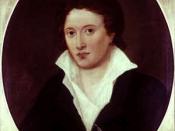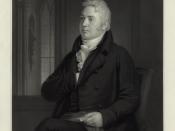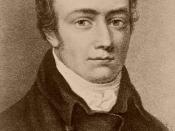The English Romantic Period was an intellectual movement with origins dating back to the late 18th century. A group of poets emerged comprising of: Blake, Wordsworth, Coleridge, Byron, Keats and Shelley. These poets embraced the basis of Romantic ideology, particularly the use of strong emotion such as trepidation and horror. The concept of individual imagination as a critical influence overturned the previous social conventions, principally the positions of the aristocracy in society. The Romantic composers also used a significant degree of historical and natural elements to stress the admiration of nature through the comprehensive, limitless use of imagination and lucid symbolism.
William Blake (1757-1827) was an English, writer, poet, and printmaker. He is most well known for his deep-rooted philosophy and idiosyncratic method of expression. Blake described the imagination as "a State: it is the Human existence itself imaginative creativity" (Blake). Some of Blake's most well known work was: "Songs of Innocence and Experience: The Two Contrary States of the Human Soul," and "The Marriage of Heaven and Hell."
Blake's work, "Songs of Innocence and Experience: The Two Contrary States of the Human Soul," was actually written in two parts. "Songs of Innocence" was written first and is a compilation of several poems discussing the love of God, the innocence of the natural world and the joy of free love. The whole compilation has a light, and upbeat tone characteristic of a childish naiveté. Directly contrasting this, "Songs of Experience" portrays the loss of innocence due to the exposure to the mortal sin of the corrupt adult world. The whole compilation is darker, concentrating more on the thematic events of the time period. Though these works are largely based on religion Blake actually resented the established Roman Catholic Church.
William Wordsworth was born in Cockermouth, in...


